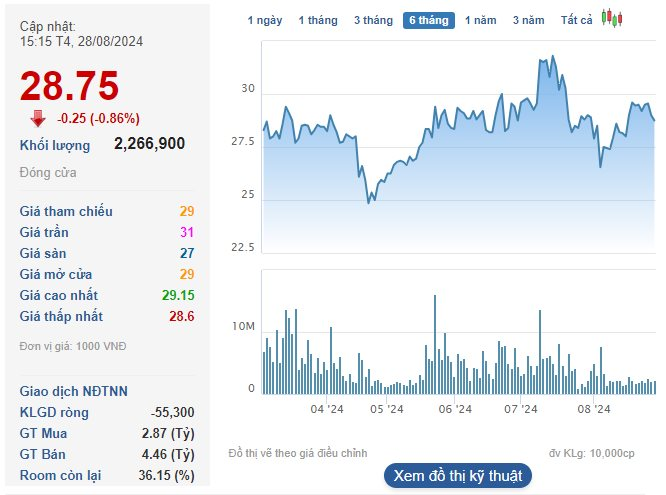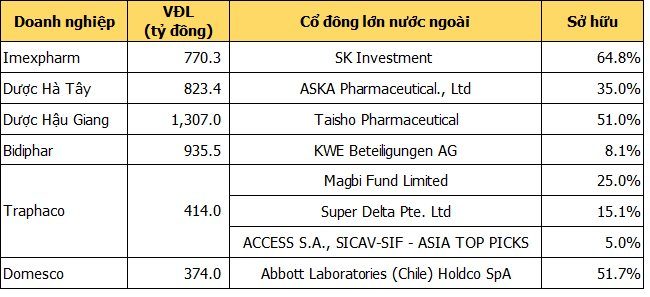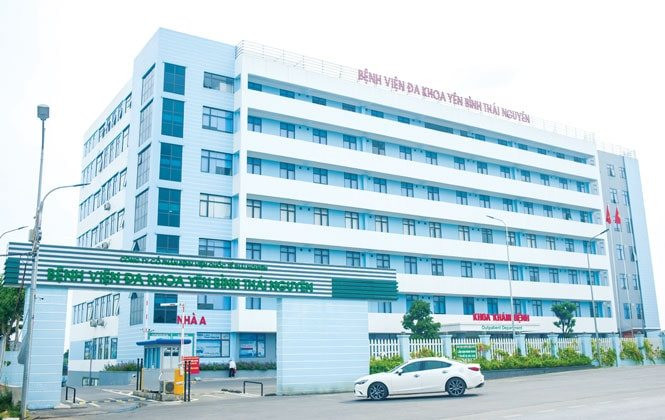The Joint Stock Company International Hospital Group TNH (stock code: TNH) has recently received approval from the SSC to increase the foreign ownership ratio at the company to 70%. Previously, this ratio was only 49%.
4 FOREIGN FUNDS ARE MAJOR SHAREHOLDERS, HOLDING A TOTAL OF 32%
At the 2024 Annual General Meeting of TNH International Hospital, the Board of Directors stated that increasing the foreign investor ratio presents an opportunity to enhance the liquidity of TNH shares in trading. Additionally, the company can strengthen its capital mobilization capabilities, expand its operations, and diversify its shareholder structure to include more foreign investors.
Currently, there are four foreign investment funds that are major shareholders of TNH, collectively holding 32% of the capital. Among them, KWE Beteilgungen AG is the largest shareholder, holding 11.5 million TNH shares, equivalent to 10.5%.

Following the announcement of the increase in foreign ownership ratio to 70% in early June 2024, TNH shares surged 35% in a month, reaching a historical peak of VND 28,500/share on July 9. However, since then, the share price has declined by more than 18%, closing at VND 23,300/share on August 28.

FOREIGN INVESTORS HAVE BEEN ACTIVELY INVESTING IN VIETNAMESE PHARMACEUTICAL AND HEALTHCARE COMPANIES
SK Investment, the second-largest chaebol in South Korea, currently controls Imexpharm (IMP) with a 64.8% stake. Additionally, ASKA Pharmaceutical Co., Ltd., a Japanese pharmaceutical company, owns 35% of Dược Hà Tây (DHT).
The hospital sector has also attracted significant interest from foreign investors, although there have been limited investment opportunities. In 2023, two notable M&A deals took place in this sector: Thomson Medical’s acquisition of FV Hospital for $381 million and Raffles Medical’s investment in Mỹ International Hospital – AIH.
The VOF fund managed by VinaCapital also holds a controlling stake in Tâm Trí Medical.

RECORD-HIGH BUSINESS PLAN
In the first half of the year, TNH International Hospital reported a 3% decrease in net revenue to VND 222 billion and a 13% decrease in after-tax profit to VND 54 billion compared to the same period last year. Thus, after two quarters, the company has achieved 41% of its revenue plan and 35% of its profit target.
This year, TNH aims for a net revenue of VND 540 billion, a 2% increase, and an after-tax profit of VND 155 billion, a 12% increase, compared to the previous year. If achieved, these figures will be record-highs for the company. TNH also plans to add preventive healthcare services such as vaccination and immunization to its business activities.
Regarding the expansion into vaccination services, Mr. Le Xuan Tan, CEO of TNH, stated that the demand for vaccines outside of the national expanded immunization program has increased significantly post-COVID, including vaccines for influenza and meningitis. TNH Hospital has a high level of expertise in vaccination and, more importantly, in emergency response in case of any adverse reactions. Many vaccination centers have signed agreements with TNH for professional support.
“There is a high demand for vaccination services at the hospital, especially in Viet Yen, an area with a large workforce employed in industrial parks. We are not concerned about competition, as setting up a vaccination department within the hospital is less challenging than establishing a separate vaccination center,” said Mr. Tan.

TNH currently operates two medical facilities: TNH International Hospital in Thai Nguyen and Yen Binh General Hospital in Thai Nguyen. Meanwhile, TNH Viet Yen Hospital in Bac Giang is awaiting licensing from the Ministry of Health.
Additionally, the company is investing in the construction of TNH Lang Son Hospital, a ten-story facility with 300 beds, designed as a general hospital.
In 2023, TNH also established a joint venture, TNH Hanoi Joint Stock Company, to invest in a project in the Nam Thang Long Urban Area (Ciputra) in Hanoi, with a planned capacity of 500 beds.
Sharing the long-term strategic vision for the next ten years, Mr. Hoang Tuyen, Chairman of the Board of Directors, said that by 2030, TNH plans to have a chain of ten hospitals nationwide, including general and specialized hospitals such as oncology, obstetrics and gynecology, ophthalmology, and stroke centers. In Hanoi, TNH does not intend to directly compete with hospitals like Hong Ngoc, Thu Cuc, or Phuong Dong, as the market is already oversaturated.
“One of TNH’s significant advantages is its network of satellite hospitals. When TNH Hanoi becomes operational, TNH will already have five satellite hospitals in neighboring provinces. The hospitals in Hanoi, Ho Chi Minh City, and Da Nang will serve as tertiary care centers, providing training and a high-quality workforce for other TNH facilities,” said Mr. Hoang Tuyen.



















